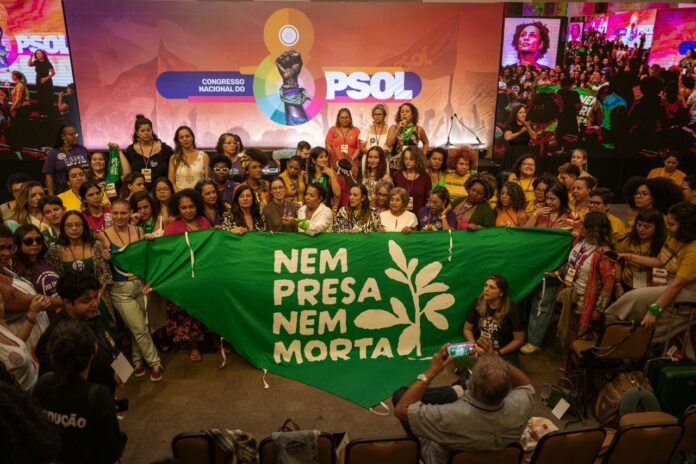Miguel Mendez – Chicago, IL (USA)
The 8th PSOL National Conference took place in Brasilia, Brazil’s capital city, between September 29th and October 1st. It had around 450 delegates, representing the Brazilian left-wing party from the whole country. The Conference took place in a crucial situation in Brazil and Latin America region, where many countries have centre-left governments and a strong far right opposition. In Brazil, the government in charge is that of Lula, from the Workers’ Party (PT), following the reactionary Bolsonaro government, having defeated his re-election attempt with a tiny margin in 2022.
Lula’s government: different from Bolsonaro, but with several bourgeois representatives and following the neoliberal agenda
Lula is the President of Brazil for the third time (two terms from 2003 to 2010, and now from January 2023). He won the election with a very broad coalition, and bears huge expectations from the majority of the working class and the oppressed people in the country. Especially after Bolsonaro’s term, who attacked the workers’ living standards, and the trade union and social movements. Furthermore, Bolsonaro held a clear agenda against the Amazon preservation, promoting at the same time misogyny, racism, hatred against the LGBTQ population, science negationism and a very reactionary ideology. Before running for his third term, Lula has been imprisoned for 580 days and was prevented to run in 2018, when he was leading the polls. This was part of the right-wing constitutional coup d’état against his successor, Dilma Roussef, also from PT. Most of Brazilian left organisations voted for Lula, to defeat Bolsonaro, in both the first round and the runoff of the 2022 presidential elections. Internationalist Standpoint published an article about that process, just after the elections (you can read it here).
The current Government coalition goes far beyond the left and centre-left parties. Mainstream sections of the ruling class have their representatives in the government, including parties and politicians who supported and even served Bolsonaro’s government. Unsurprisingly, Lula’s third term is not moving towards the necessary structural changes in Brazil, to deliver the expectations of millions of workers upon it. Of course, there is a completely different approach and government propaganda about pretty much everything, when compared to the fascist Bolsonaro. However, the economic agenda follows the neoliberal guidelines. The Minister Fernando Haddad, also from PT, is leading tax and budget reforms which have been praised by the Brazilian and imperialist bourgeoisies as “modern and effective” reforms, with clear elements of austerity and cuts on social investments.
PSOL at a crossroad: independent and anticapitalist party, or part of the government and its class coalition broad alliance?
PSOL is an important left-wing party in Brazil, with more than 300,000 affiliated members. It has 13 representatives elected to the Brazilian Congress, and many others in state and city level parliaments. Currently PSOL governs Belem, the capital city of Para, a federal state in the Amazon region.
PSOL correctly voted for Lula in last year’s election. There was a fierce debate within that party if it should or not ingress in the formal coalition, as it included several bourgeois parties and traditional right-wing politicians, like the vice president Geraldo Alckimin.
The groups in PSOL advocating for not entering the coalition had the main concern that by being part of it, PSOL was facing the risk of integrating into the government itself, instead of having an independent approach towards it.
PSOL has been part of the government since its inauguration. PSOL has a ministerial position, in a symbolic Ministry to protect indigenous people, and several appointed members in high rank roles across the government. Also, PSOL is formally part of the Government Support Bloc, having its deputy leader.
The 8th National Conference provided the opportunity to change that status, and move PSOL to an independent position. This unfortunately did not happen.
Local elections in Brazil are going to take place in 2024. In Sao Paulo, the biggest and most important city, a PSOL candidate is leading the polls, openly supported by Lula, and building a broad coalition, including right-wing politicians who served under previous neoliberal governments. The campaign staff is moving the party to a more “moderate” profile, to be able to build that alliance and attract moderate votes.
Unfortunately, the proposals to the Conference to overturn that situation have been defeated. The tensions between both blocs escalated at the Conference, and it ended with despicable scenes of aggressions from both sides, widely broadcasted by the mainstream media the days after the Conference.
PSOL, internally, has two main blocs. The majority, is the bloc ready to be integrated or supportive of the government and in favour of building a broad alliance. And a left opposition, who has been opposing the way that PSOL is following, and had 33% of the delegates to the Conference.
Recently, Brazil celebrated 10 years of the June 2013 uprising. That happened when the 2008 international crisis hit Brazil and the PT’s government responded to that with austerity and neoliberal policies. In 2016, the right-wing organized mass demonstrations to remove the president Dilma, capitalising on the working-class disillusionment with the government, and the inability of the Left to present itself as the alternative. That is what usually happens when the left capitulates to class coalition governments sacrificing its political and class independence.



